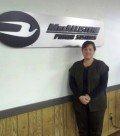 Movin’ On Up takes pride in recognizing outstanding Express Employment Professionals associates who’ve been acknowledged by one of our Express offices. Every associate we put to work has a story to tell, and we want to celebrate the accomplishments of the individuals who come to work for us.
Movin’ On Up takes pride in recognizing outstanding Express Employment Professionals associates who’ve been acknowledged by one of our Express offices. Every associate we put to work has a story to tell, and we want to celebrate the accomplishments of the individuals who come to work for us.
This month’s associate spotlight recognizes an associate who never gives up despite the most unexpected of obstacles – Anthony Tamporello from the Covington, LA Express office.
A Hard Worker
Born and raised in New Orleans, Anthony Tamporello has always been a go-getter. After serving five years overseas with the Marine Corps., Anthony returned home to focus on his education. He enrolled in Louisiana State University and began studying, ready for the opportunities his education would bring. But, instead of being able to focus on school and prepare for his future career, Anthony’s life took an unexpected turn.
In 2005, Hurricane Katrina tragically destroyed the city of New Orleans. The storm took nearly everything in its path, including Anthony’s home. Suddenly homeless, Anthony was forced to put a hold on his educational dreams in order to help his family get back on their feet. He went to work with his uncle to rebuild homes in the wake of the hurricane and relied on his associate’s degree in computer technology engineering to secure a job that helped him save money. Eventually, Anthony saved enough money to go back to college.
An Outstanding Associate
In 2010, Anthony graduated from Louisiana State University with a bachelor’s degree in management. Despite finding a job quickly after graduation, Anthony found himself unemployed in January 2014 after the company he worked for experienced job cuts. That’s when he discovered Express.
“Anthony posted his resume to an online job board and hoped he would be able to find something to put his education to use,” said Heather Modicut of the Covington, LA Express office. “Within a month of posting his resume, Paul Tosso came across it.”
As a Contract Search Specialist with Express, Paul had an opportunity he thought would make a great fit for Anthony.
“From the very first conversation I had with Anthony, I knew he was a hard worker,” Paul said. “And, his references verified that.”
According to Paul, Anthony is the kind of person who can handle anything thrown his way. He has a strong work ethic and is dedicated, which makes for a great Express associate.
Anthony has been in his new position for several months and is very happy with his new job.
Express is proud to have you working for us, Anthony!
If you’re an Express associate or know an associate who would be a great candidate for our associate spotlight, let your Express office know. And, if you work with an Express associate you’d like to feature on Movin’ On Up, let us know in the comments section below.
Movin’ On Up is brought to you by Express Employment Professionals.





